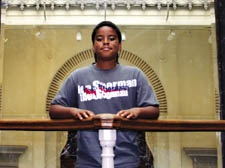|
|
 |
| |

Isaac Cobbinah takes on the role of young George Bridgetowerin writer Mike Phillips’ and Julian Josephs’ opera |
Boy George, the prodigy who was toast of Europe
A groundbreaking opera reveals how a young black violinist thrilled Beethoven, only to die poor and alone.
Simon Wroe meets its 11-year-old star
A BUZZ is growing around composer Julian Josephs’ new jazz opera, Bridgetower. And in a matter of weeks all eyes will be turned on Isaac Cobbinah, an 11-year-old from Camden Town.
For Isaac plays the title role of Bridgetower as a young boy in a true story of the African child prodigy who wowed the 19th-century courts of Britain, France and Germany with his virtuoso violin playing.
Isaac will share the role with fellow child actor Jamal Hope in a groundbreaking production that blends jazz improvisation and “swinging” with traditional opera forms.
Stage fright does not seem to bother Isaac. The youngster’s preternatural calm seems even more impressive when you consider this opera is his first professional outing. Surely, I ask, all this must make him a little nervous?
“Not really,” he smiles. “It’s fun.”
“It’s daunting for me,” his mother, Angela, interjects. “He’s not a trained singer. He’s only been singing for a couple of months. But Isaac has always been a performer. From a very early age he was entertaining the family; singing and dancing and doing impressions.”
It was these early forays into the limelight that prompted Ms Cobbinah to send her child to the Young Actors Theatre in Barnsbury and the junior weekend sessions at WAC, the performing arts college, on top of his studies at Kentish Town Primary School.
Isaac was discovered when jazz singer Cleveland Watkiss, who plays the adult Bridgetower, dropped in to WAC in May and saw Isaac singing with the London Lads, a classically trained choir formed of young local boys of African descent.
“He came in and asked me to sing something for him, so I sang him The Mighty King from The Lion King and he gave me lots of papers to take away and read,” here he grins sheepishly, “...but I lost them.”
This did not dissuade the Bridgetower team, however. A week later, Julian Josephs came in person to audition Isaac again, and the deal was closed soon after.
“Isaac really sparkles,” says Julian. “He learns quick and he’s determined to do something with his talent. If he can seem a bit nonchalant sometimes it’s because he’s still discovering what he has.”
In a tidy twist of fate, Mr Josephs was a former WAC student himself; one so passionate about the course that he came every week from Wandsworth to attend the Kentish Town classes, and even persuaded a young Courtney Pine to join. The jazz composer, pianist and band-leader describes WAC as “a place full of incredible talent and encouragement”.
Despite venerating classical composers like Verdi, Tchaikovsky and Prokofiev, Mr Josephs sees himself as “completely and essentially a jazz musician” and insists that the new opera will reflect this. The idea, he says, is to use the story of the young African prodigy to give jazz a fresh, dramatic setting, “out of its own time”.
“I want to show jazz can be a dramatic art,” he says, “but I also want to tell stories that relate to my own culture and my British background.”
The life of George Augustus Bridgetower (1780 – 1860) is a fascinating tale. He was born in Biala in Poland, the son of a local woman and John Frederick, a member of the household of Prince Nikolai Esterhazy. Bridgetower was raised in the prince’s castle, which boasted an opera house and the composer Haydn as Kappelmeister.
“If Bridgetower was a child prodigy, destiny clearly provided him with the best possible environment and training,” observes the novelist and writer Mike Phillips, who penned the libretto for Bridgetower and on whose historical study of black Europeans much of the opera is based.
The young Bridgetower made his performing debut in Paris in 1789, around his 10th birthday. The journal Le Mercure de France raved about his performance, stating that “his talent is one of the best replies one can give to philosophers who wish to deprive people of his nation and his colour the opportunity to distinguish themselves in the arts.”
At the age of 23 he was chosen by Beethoven to premiere his penultimate violin sonata in A minor.
“Bridgetower’s legacy was not only about music,” says Mr Phillips. “It was also about the possibility of transforming and transcending one’s circumstances, and the contribution it was possible to make in shaping one’s environment, even under the most difficult circumstances.”
The story has a sting in its tail though – despite his accomplishments Bridgetower died poor and alone in Peckham in 1860.
Ms Cobbinah brushes off the musical prodigy comparisons between Bridgetower and Isaac, saying: “It’s an experimental opera, which is trying to break new ground, and it’s always good to be associated with that.
“But he’s only 11 and he’s got a lot of room to develop. He’s been given a wonderful opportunity and we’ll take it from there.”
|
 |
|
| |
|
 |
|

